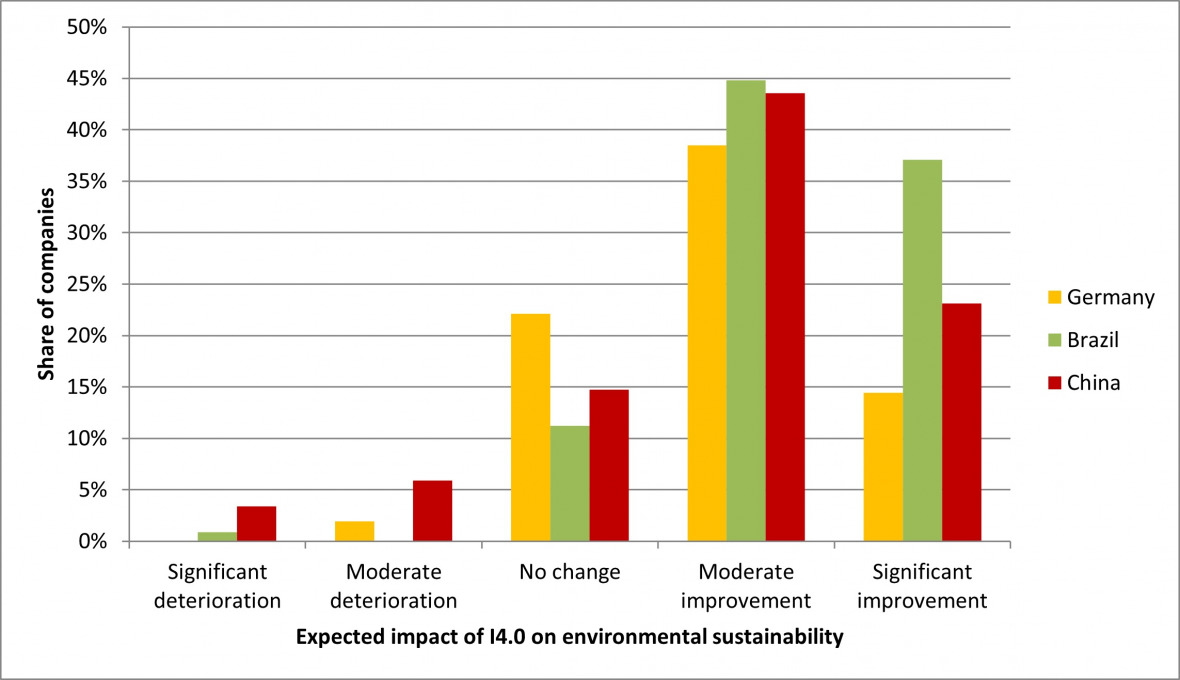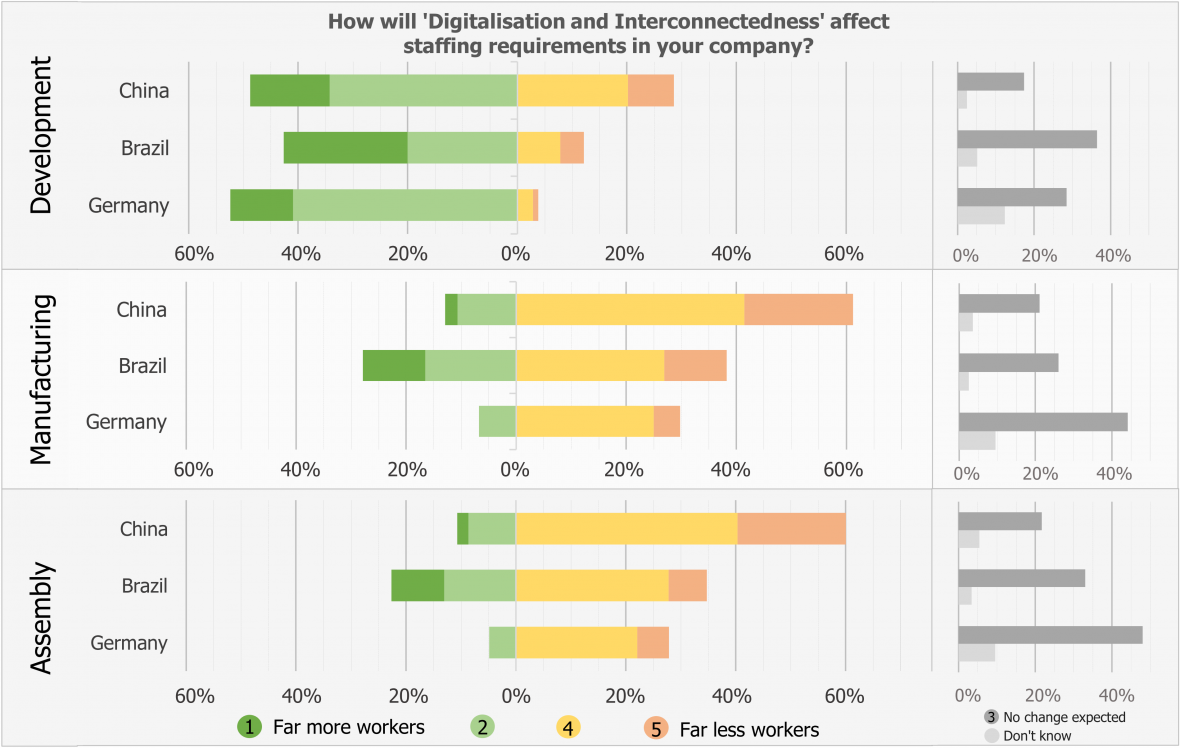A digitalized economy for a more sustainable future
01.07.2022

The digital transformation of the economy
In many countries, the digital transformation has defined economic development over the last ten years. A number of large economies have developed their own national plans to promote the widespread uptake of digital technologies in manufacturing. These include Germany’s “Industrie 4.0” and China’s “Made in China 2025.”
In previous blog posts by the IASS research group “Digitalisation and Sustainability Transformations,” we already shed light on how the digital transformation can be shaped to create a more sustainable economy, as well as to what extent digitalization influences resource consumption. In our view, the most important guiding principles for industrial transformation are decarbonization and dematerialization. Decarbonization aims to reduce emissions harmful to the climate, in particular CO2, while dematerialization aims to produce goods and services with a minimum of material inputs and, as far as possible, to employ materials or processes that are less harmful to the environment.
To take stock of industry’s real-world experience with digitalization to date and the expectations that exist with regard to sustainability impacts, the research group “Digitalisation and Sustainability Transformations” conducted an international study in China, Brazil, and Germany. Their results clearly show that the moderate gains made thanks to digitalization lag far behind the high hopes that many hold for it. The researchers surveyed company representatives across a range of industrial sectors and from companies of different sizes. Their responses indicate that they expect that digitalization will generally improve the environmental sustainability of their organizations (see Figure 1). In Germany and Brazil, this is especially true for companies with more than 5,000 employees, though large differences were found between the individual sectors. However, the companies’ actual experience with digitalization paints a less favorable picture: digital technologies have so far not led to much of an improvement in resource efficiency or a reduction in energy consumption (Beier et al., 2022a).

Figure 1: Expectations on the impact of I4.0 on corporate environmental sustainability
The study also provides evidence that the impacts of digitalization on staffing needs vary according to department. In departments that tend to employ a larger share of comparatively low-skilled workers, many expect a decline in staffing requirements (see Figure 2). This suggests increasing polarization between high-skilled and low-skilled workers in terms of employment opportunities. The effect is particularly prevalent in larger companies. Moreover, employee qualifications are expected to rise in all areas (Beier et al., 2022b).

Figure 2: Changes in staffing requirements due to Industry 4.0 in the areas of development, manufacturing, and assembly
These findings highlight the difficulties of monitoring the consequences of the broad application of digital technologies in industry and question claims that increases in the degree of digitalization automatically translate into more sustainable production methods.
The digitalization of international development: The local context is crucial when investing in a more sustainable future
Digital technologies also have implications for international development: they help reach populations in both urban and rural settings, and they play a prominent role in countless development issues and sectors. So, it comes as no surprise that many governments and international organizations see great potential for socioeconomic development in digitalization and have high hopes for the digitalization of the economy, especially as a driver of development in the industrial and service sectors (Matthess & Kunkel, 2020). The problem is that economic rationalization and efficiency gains could go hand in hand with a widening of the existing digital divide (Beier et al., 2020) between less developed and more technologically advanced countries. This is especially true given that these dramatic economic changes must also be reconciled with local social and cultural values.
While certain digital technologies and services do hold the possibility of better integrating less developed countries into economic networks and improving equity among actors, these opportunities might not come to fruition due to economic power imbalances, administrative failures, or if other contextual factors are neglected. Also, although the literature cites numerous ways that small and medium-sized enterprises (SMEs) could profit from introducing digital technologies, many of these companies do not get past a basic level, in part due to the high cost of the needed infrastructure and ever-increasing technological requirements (Ahmad et al. 2015).
Local contexts must also be considered when balancing the opportunities and risks that digital technologies and services hold for justice and inclusion. To fully understand the evolving patterns of digital capacity building and use, transdisciplinary approaches should be adopted that take into account not only the perspectives, customs, and requirements of scientific and technical expertise, but also and especially those of non-academic and non-technological experts from the region where the technology is to be introduced (Renn et al., 2021).
The digitalization of industry is often believed to generate economic growth and job creation while also paving the way for greener development. But this isn’t always the case, with some studies showing that digitalization is less likely to result in job growth in low-income countries (e.g., Ugur & Mitra, 2017). Many governments and government agencies have developed policies and programs to foster the emergence of a knowledge economy so that their countries can also benefit from the digital transformation. Promoting education and research, supporting the creation of innovative companies, and modernizing electricity and telecommunications infrastructures are the most preferred way to reach this goal.
Conclusions
We are currently witnessing two parallel global transformations: the digital transformation and the transformation towards sustainability. One of the biggest challenges in shaping these transitions will be to narrow the digital divide between the Global North and the Global South. For many developing countries, following traditional industrialization paths may not be the wisest economic choice to achieve this.
One of the major challenges in this transformation process will be to design policies so that that they promote inclusion in global value networks while avoiding exacerbating the existing digital and social divide. When integrating the concepts of international development and sustainability into policies, it is critical to consider the concept of sustainable development as well. This implies that all policies that seek to combine these two concepts should be guided by the UN Sustainable Development Goals (SDGs) to ensure that the desired socioeconomic development is not only forward-looking, but also focuses on the well-being of both humans and the environment.
Building a vibrant digital economy must be accompanied by frameworks that both strengthen “digital skills” and provide for “policies and regulations” that encourage the development of innovative digital hardware and software solutions and digital business models. At the same time, policymakers must strike a balance between economic development, technological progress, and the creation or preservation of employment opportunities to ensure that this transition is ultimately inclusive.
There is some concern that digitalization could lead to rifts in international cooperation. To minimize this risk and achieve inclusion, skill development in low-income countries is absolutely essential. Against the backdrop of these complex challenges, future strategies should involve policymakers, scientists, and civil society actors from the respective region to clarify which technology- and sector-specific interactions will lead to beneficial links between processes of structural change and digitalization in the Global South. Most importantly, the ongoing process of digital transformation will have to be politically steered so that digital technologies support the improvement of education, health care systems, and livelihoods while also contributing to a more environmentally sustainable and inclusive way of life.
References
Ahmad, S. Z.; Bakar, A. R. A.; Faziharudean, T. M.; Zaki, K. A. M. (2015). An Empirical Study of Factors Affecting e-Commerce Adoption among Small- and Medium-Sized Enterprises in a Developing Country: Evidence from Malaysia. Information Technology for Development, 21:4, 555-572. DOI: 10.1080/02681102.2014.899961. Link
Beier, G.; Matthess, M.; Guan, T.; de Oliveira Pereira Grudzien, D. I.; Xue, B.; Pinheiro de Lima, E.; Chen, L. (2022a): Impact of Industry 4.0 on corporate environmental sustainability: comparing practitioners’ perceptions from China, Brazil and Germany. Sustainable Production and Consumption, (Vol. 31, pp. 287–300). DOI: 10.1016/j.spc.2022.02.017. Link
Beier, G., Fritzsche, K., Kunkel, S., Matthess, M., Niehoff, S., Reißig, M., van Zyl-Bulitta, V. (2020): A green digitalized economy? Challenges and opportunities for sustainability. IASS Fact Sheet, 2020, 1. DOI: 10.2312/iass.2020.028 Link
Beier, G.; Matthess, M.; Shuttleworth, L.; Guan, T.; de Oliveira Pereira Grudzien, D. I.; Xue, B.; Pinheiro de Lima, E.; Chen, L. (2022b). Implications of industry 4.0 on industrial employment: A comparative survey from Brazilian, Chinese, and German practitioners. Technology in Society (p. 102028). Elsevier BV. DOI: 10.1016/j.techsoc.2022.102028. Link
Matthess, M.; Kunkel, S. (2020). Structural change and digitalization in developing countries: Conceptually linking the two transformations. Technology in Society (Vol. 63, p. 101428). Elsevier BV. DOI: 10.1016/j.techsoc.2020.101428. Link
Renn, O.; Beier, G.; Schweizer, P.-J. (2021): The opportunities and risks of digitalisation for sustainable development: a systemic perspective. GAIA - Ecological Perspectives for Science and Society, 30(1), 23–28. DOI: 10.14512/gaia.30.1.6. Link
Ugur, M.; Mitra, A. (2017). Technology Adoption and Employment in Less Developed Countries: A Mixed-Method Systematic Review. World Development (vol. 96, p. 1-18). DOI: 10.1016/j.worlddev.2017.03.015. Link
